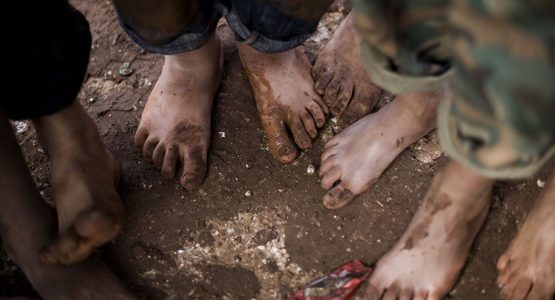
Denmark’s repatriation of Islamic State terrorist’s son projected to ‘open the door’
In the aftermath of a notable precedent, it will be difficult for the Danish authorities to say no to family re-unifications with ISIS terrorists, pundits have warned.
A 13-year old Danish orphan, whose father died in Syria as a Daesh terrorist and whose mother openly supported the terrorist organisation, has been rescued from the Al-Hol camp in Syria, Danish Radio reported.
The boy was severely injured with leg paralysis after being shot in the back during the fight for the Syrian city of Baghouz and was unable to get the required help at the camp, where he was living with his mother and siblings.
The evacuation was overseen by personnel from the Danish Foreign Ministry. The boy was taken out of Syria in an ambulance and will now be treated at a hospital until his health improves.
The evacuation was made possible by a special agreement between Denmark’s Foreign Ministry and Syria’s Kurdish community. While children are usually not allowed to be taken out without their mothers accompanying them, an exception was made in this case due to the boy’s deteriorating health and lack of proper treatment.
According to Claus Juul of Amnesty International, the decision was solely based on humanitarian considerations, as no legal condition forced Denmark to retrieve the boy. According to Peter Vedel Kessing of the Human Rights Institute, the repatriation creates a precedent “which means other Danish children with health problems should have the same chance to ensure that all are treated equally”.
The evacuation of the terrorists’ son raised further questions, such as the fate of the 13-year-old’s mother and siblings, who are still in the Al-Hol camp. The 13-year-old’s mother confirmed she would now like to return to Denmark with the rest of her children.
According to Juul, the moment the boy landed on Danish soil, he gained the “right to family life”, which implies the right to family unification. This, however, may be at odds with safety considerations, should there be reason to suspect that his parents have participated in human rights violations on behalf of Daesh.
Meanwhile, the Danish authorities are divided on this issue following a national election that failed to yield a government in three weeks.
While the left-of-the-centre parties support the repatriation of Danish citizens “to avoid further radicalisation”, the Social Democrats, who showed the best electoral performance and are expected to form a government with fellow members of the “red” bloc, are still undecided on this issue. Social Democrats leader Mette Frederiksen, however, has previously slammed the idea of taking back Danish citizens who have travelled to the Middle East to support the terrorists’ cause, as have the right-of-the-centre parties.
According to the right-wing Danish People’s Party, the children must be helped on the spot, whereas their parents must be prosecuted.
A total of 25 women and children of Danish descent are currently living in camps in northern Syria. As Danish Radio put it, the recent evacuation may “open the door” for other “Daesh children”.
While it remains a highly controversial topic, several other European countries, including Belgium, Norway, Sweden and the Netherlands, have recently also started the retrieval of Daesh terrorists’ orphans.
Source: Sputnik





